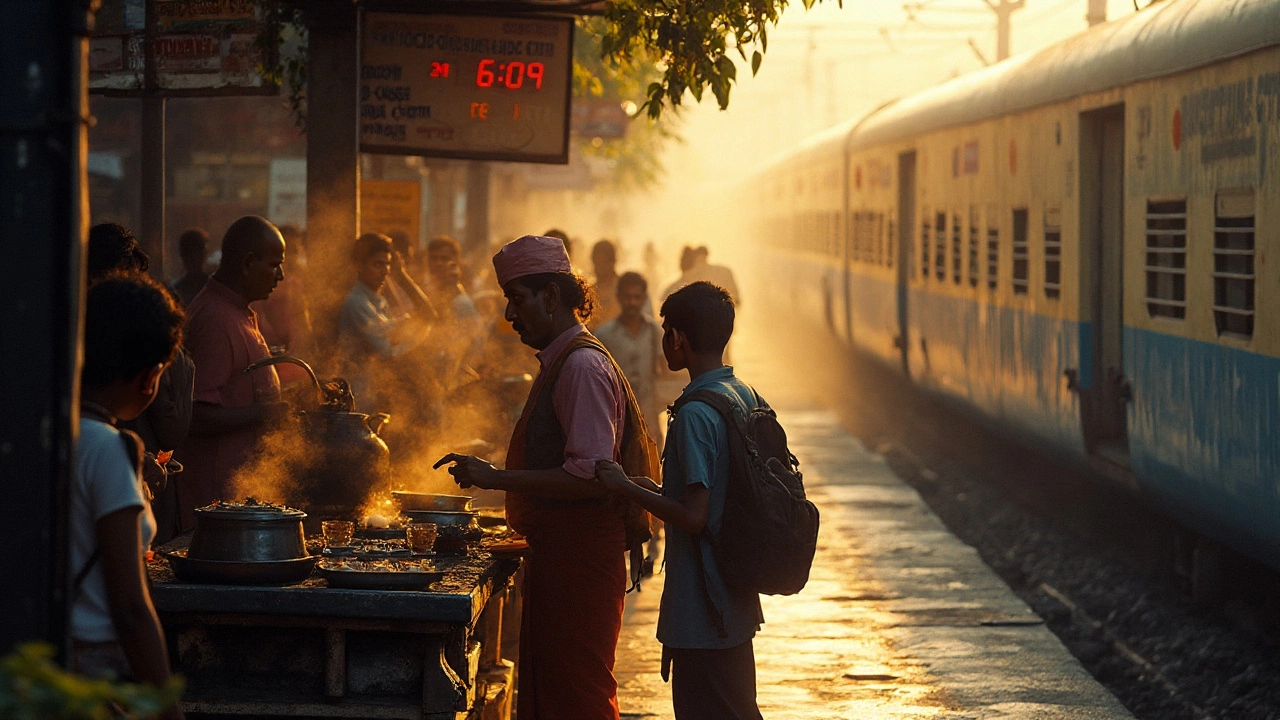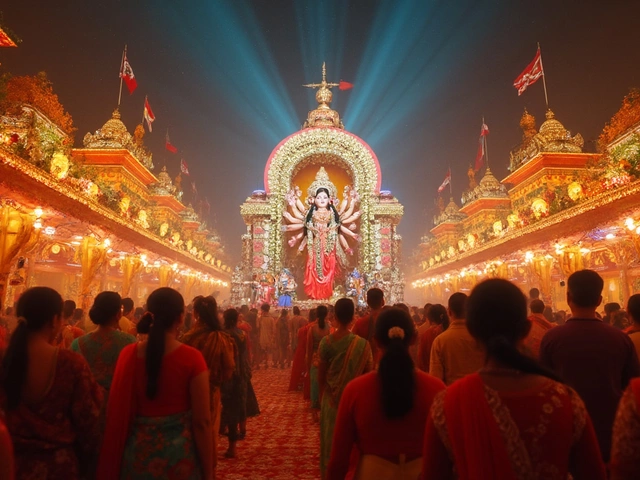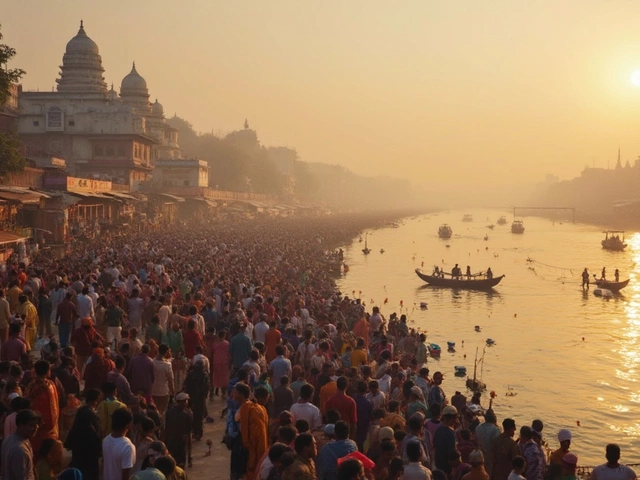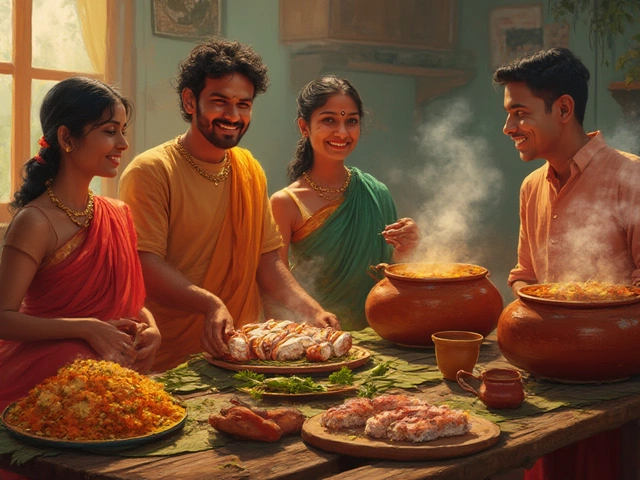Ask ten people in India what they drink for breakfast and you’ll hear ten quick answers-chai, filter coffee, lassi, chaas, turmeric milk, even sattu. The real win here is knowing what’s common, what’s regional, and how to pick something you’ll actually love. You’ll get a clear list, simple recipes, a region-by-region guide, a quick chooser, and the answers people usually ask after trying these for the first time.
If you only remember one thing, remember this: tea rules most of India’s mornings; filter coffee rules the south; yogurt-based drinks cool the west and north in summer; there’s always a caffeine-free option if you want one.
TL;DR: What people in India drink for breakfast
- Chai (tea with milk and sugar) is the default in most places. Variants: masala chai, ginger chai, cardamom chai, “cutting” chai (small glass).
- South India loves filter coffee (kaapi): strong decoction + hot milk, often slightly sweet.
- Yogurt-based drinks pop up with breakfast, especially in heat: sweet lassi (Punjab), salted lassi/chaas (Gujarat, Rajasthan, Maharashtra).
- Regional specials: Kashmiri kahwa or noon chai; sattu drink in Bihar; black tea (“lal cha,” “kattan”) in Assam, Bengal, Kerala.
- Non-caffeine go-tos: warm milk, almond/badam milk, turmeric milk, cumin or lemon water.
Short on time? Order chai almost anywhere; in Chennai or Bengaluru ask for filter coffee; in Amritsar try lassi; in Ahmedabad or Jaipur ask for chaas with breakfast.
Make the classics at home: chai, filter coffee, and quick alternates
You don’t need fancy gear to make the big two. A pot, a strainer, and a steady flame cover most of it. Here’s how to nail the basics without turning your kitchen into a spice lab.
Indian breakfast drinks feel special because they’re simple and balanced-heat, spice, a touch of sweet, and a creamy finish.
Masala chai (serves 2)
- Crush 3-4 green cardamom pods, a small piece of cinnamon, 2-3 cloves, and a coin of fresh ginger. (Skip spices for plain chai.)
- In a saucepan, add 1 cup water + spices. Simmer 3 minutes to bloom aroma.
- Add 2 heaped teaspoons loose black tea (CTC tea works best). Simmer 1 minute.
- Pour in 1 cup milk (dairy or plant). Bring to a gentle boil; simmer 2 minutes. Stir so it doesn’t scorch.
- Sweeten to taste (1-2 teaspoons sugar is typical). Strain into cups.
- Pro tip: For stronger tea, simmer longer before adding milk. For silkier chai, add a splash of milk cream at the end.
- Dairy-free: Oat milk gives the closest body; almond milk works if you keep heat low to avoid splitting.
South Indian filter coffee (kaapi) without stress
Traditional kaapi uses a metal filter (decoction maker). No filter? Use a French press.
- Grind coffee medium-fine. A blend with 10-20% chicory is classic, but 100% coffee works.
- For decoction: Add 3 tablespoons coffee to the filter, pour ~150 ml hot water, and let it drip 10-15 minutes.
- For French press: 1:12 ratio (20 g coffee, 240 ml water), 4-minute steep, press slowly.
- Heat 200 ml milk until just steaming. In a tumbler, add 30-40 ml decoction, top with hot milk, sweeten lightly. Adjust to taste.
- Pro tip: Don’t boil brewed coffee with milk; combine hot milk and hot decoction at serving to keep aroma intact.
- No chicory? Use a darker roast to mimic weight; add a small pinch of jaggery for a caramel note.
Quick lassi (sweet or salted)
- Blend 1 cup thick yogurt + 1/2 cup cold water.
- For sweet: 1-2 tablespoons sugar or honey + pinch of cardamom.
- For salted: 1/4 teaspoon salt + pinch of roasted cumin powder + a few mint leaves.
- Serve chilled. No ice if you want it smooth.
Tip: For chaas (buttermilk), thin it more (1:1 yogurt to water), keep it salted, and whisk well.
Badam milk (almond milk, the Indian way)
- Soak 10-12 almonds overnight. Peel and blend with 1/2 cup water to a smooth paste.
- Simmer 2 cups milk with a pinch of saffron and 1-2 crushed cardamoms 5 minutes.
- Stir in almond paste; sweeten with sugar or dates. Heat gently 2 minutes. Don’t boil hard.
Dairy-free version: Use unsweetened almond milk and skip the paste; warm gently with saffron and cardamom.
Light and caffeine-free sips
- Turmeric milk: Warm milk + 1/4 teaspoon turmeric + pinch black pepper + honey.
- Jeera water: Simmer 1 teaspoon cumin in a cup of water, strain, sip warm.
- Lemon water: Warm water + lemon + pinch of salt; easy on the stomach.
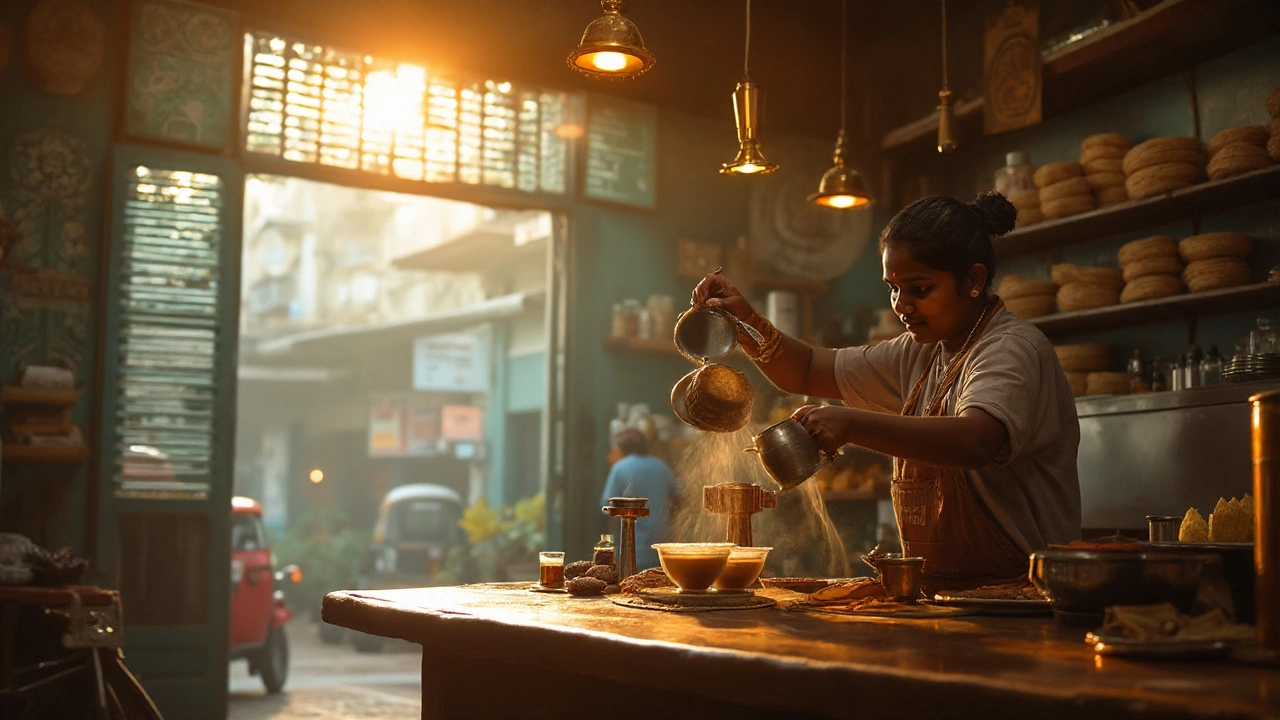
Regional morning habits: who drinks what, where, and when
India is large and the morning glass changes with the map. Here’s the fast tour, with what you’ll actually see on tables and at roadside stalls.
- North India (Delhi, Punjab, Haryana, UP): Chai is everywhere-often ginger-heavy in winter. In Punjab, a tall sweet lassi can be breakfast by itself. In winter, hot milk with a skin of cream (“malai”) shows up in some homes.
- West India (Maharashtra, Gujarat, Rajasthan): Mumbai runs on “cutting chai”-a small, strong glass. Gujarat and Rajasthan beat the heat with chaas (salted buttermilk) alongside poha, theplas, or parathas.
- South India (Tamil Nadu, Karnataka, Kerala, Telangana, Andhra): Filter coffee is the hero in Tamil Nadu and Karnataka-poured back and forth between a tumbler and davara for foam. Kerala leans black tea (“kattan chaaya”) or milk tea with puttu, appam, or idiyappam; Malabar also serves spiced black tea called sulaimani.
- East and Northeast (Bengal, Odisha, Assam, Meghalaya): Assam has bright, brisk tea; milk tea or black tea is common. In Bengal, you’ll find milk tea and “lal cha” (black tea) in clay cups. Odisha tends to similar patterns with chai and buttermilk in heat.
- Himalayan belt and Kashmir: Kashmiri kahwa (green tea with saffron and nuts) in winter, and noon chai-salted pink tea with bread-at breakfast in some homes.
- Central and East (Bihar, Jharkhand): Sattu ka sharbat (roasted gram flour drink) is a legit morning staple in hot months-savory or slightly sweet, filling, and cheap.
Food pairings matter. Idli, dosa, vada often pair with filter coffee; parathas with masala chai or chaas; poha with cutting chai; chole bhature with a sweet lassi on weekends. In cities, you’ll also see cold coffee, smoothies, oats drinks, and soy or almond milk becoming common at cafes, but the home default hasn’t shifted far from tea or kaapi.
Two quick realities: street-side chai in tiny glass cups is still the most democratic morning drink; and in the south, your best cup of coffee might be at a humble vegetarian eatery rather than a glossy cafe.
Choose your morning drink: quick guide, table, and ordering tips
Pick by weather, caffeine, and how light you want to feel after eating. If you sweat easily or the day will be hot, go for chaas or salted lassi. If you need a wake-up, choose filter coffee or masala chai. If your stomach is tender, black tea or cumin water is safe.
- Need caffeine? Filter coffee (high), masala chai (medium), black tea (medium), kahwa (low-medium).
- Dairy-free by default? Black tea, kahwa, sattu drink (with water), cumin or lemon water.
- Cooling options for summer? Salted lassi and chaas are the most refreshing with spicy breakfasts.
- Sweet tooth? Sweet lassi or cardamom-heavy chai. For less sugar, ask “sugar less” or “chini kam.”
- Kids or no-caffeine? Warm milk, turmeric milk, almond milk, or lightly sweetened sattu.
| Drink | Typical regions | Caffeine | Dairy | Sweetness | Usual temp | Good with | Kid-friendly |
|---|---|---|---|---|---|---|---|
| Masala chai | All India | Medium | Yes (milk) | Light-Medium | Hot | Parathas, poha, buns | Yes (mild spice) |
| Cutting chai | Mumbai/Maharashtra | Medium | Yes | Medium | Hot | Vada pav, poha | Sometimes |
| Filter coffee (kaapi) | Tamil Nadu, Karnataka | High | Yes | Light | Hot | Idli, dosa, upma | Not ideal |
| Black tea (kattan/lal cha) | Kerala, Bengal, Assam | Medium | No | Low | Hot | Light breakfasts | Yes |
| Sweet lassi | Punjab, North India | None | Yes (yogurt) | High | Cold | Alone or with parathas | Yes (watch sugar) |
| Salted lassi / Chaas | Gujarat, Rajasthan, West India | None | Yes (yogurt) | Low | Cold | Spicy or oily foods | Yes |
| Kashmiri kahwa | Kashmir | Low-Medium | No | Low | Hot | Dry breads, nuts | Yes |
| Noon chai (salted) | Kashmir | Medium | Yes | Low (salty) | Hot | Bread, kulcha | Sometimes |
| Sattu drink | Bihar, Jharkhand | None | No (usually water) | Low-Medium | Cool | Alone or with roti | Yes |
| Turmeric milk | All India | None | Yes (or plant milk) | Low | Hot | Light breakfasts | Yes |
Ordering tips on the ground
- Chai types: “adrak wali chai” (ginger), “elaichi chai” (cardamom), “masala chai” (spice mix), “kali chai” (black tea).
- Size: In Mumbai, “cutting chai” means a small glass. Elsewhere, just say “small cup.”
- Less sugar: Say “chini kam,” “sugar less,” or “without sugar” if needed.
- Less milk: Ask for “tea strong, milk less” or “kadak chai.” For coffee: “strong” or “light.”
- Lassi/chaas: Ask “sweet or salted?” For chaas, cumin and mint are common add-ins.
Hygiene and safety
- Hot drinks are safer at street stalls because they’re boiled. Watch for clean utensils and fresh milk.
- Look for places with Food Safety and Standards Authority of India (FSSAI) hygiene grades; several cities run “Clean Street Food Hub” programs.
- In summer, avoid watered-down cold drinks with ice at small stalls; choose sealed water or hot beverages.
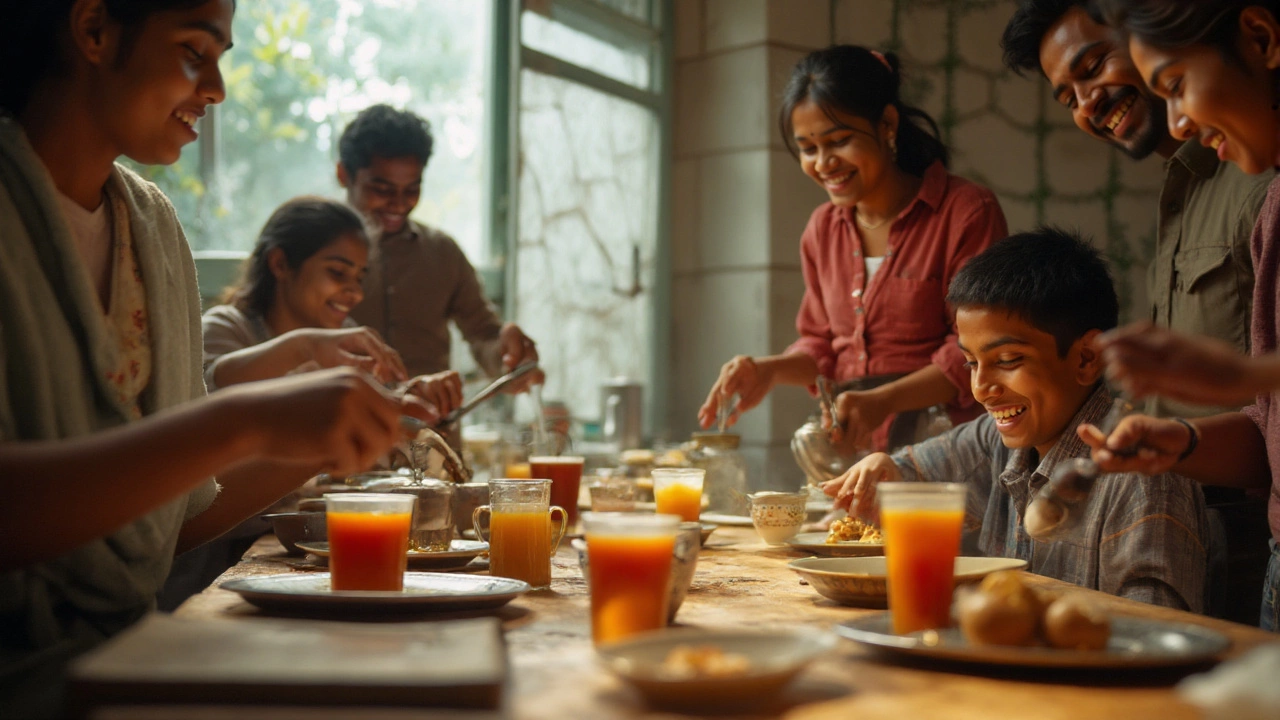
FAQ and next steps
Is tea more common than coffee at breakfast?
Yes. Tea is the morning default in most Indian households. The Tea Board of India (2024) reports tea remains the most consumed beverage nationally. Coffee is a strong regional culture in the south; the Coffee Board of India (2024) notes domestic coffee consumption keeps rising, led by Tamil Nadu and Karnataka.
I’m avoiding caffeine. What are my options?
Go for turmeric milk, warm milk with cardamom, chaas (salted buttermilk), sweet or salted lassi, sattu drink (with water), jeera water, or lemon water. Black tea has caffeine; if you want a light buzz, kahwa is mild.
Can I do dairy-free in India?
Yes, especially in cities. Many cafes offer oat, almond, or soy milk. On the street, black tea (“kali chai”/“kattan chaaya”) and kahwa are easy wins. At home, masala chai works with oat milk if you simmer gently and add milk after tea has brewed.
How sweet are these drinks?
Street chai and lassi often skew sweet. Say “chini kam” or “no sugar” to dial it back. Filter coffee is usually lightly sweet-easy to take unsweetened.
Are spice-heavy drinks good for digestion?
Ginger, cardamom, cumin, and black pepper are traditional for a reason-many people find them soothing. Ayurveda texts and modern dietetics both point to ginger and cumin aiding digestion; still, if your stomach is sensitive, go mild and build up.
Can I get espresso-based drinks in the morning?
In major cities, yes-cafes open early. But if you want what locals grab at home or at a corner stall, ask for chai or filter coffee.
What should travelers try first?
- Big cities: Cutting chai in Mumbai, filter coffee in Chennai/Bengaluru, sweet lassi in Amritsar, chaas in Ahmedabad/Jaipur.
- Tea country: Black tea in Assam or Darjeeling; clay-cup chai in Kolkata.
- Cool weather: Masala chai; in Kashmir, kahwa or noon chai.
Batching for busy mornings
- Chai concentrate: Brew strong tea with spices in water only; refrigerate up to 3 days. At breakfast, heat 1:1 with milk and sweeten.
- Filter coffee decoction: Drip a double-strength decoction, refrigerate 2-3 days; warm with milk when needed.
Quick troubleshooting
- Chai curdles with plant milk: Lower the heat, add plant milk at the end, and avoid boiling after adding it.
- Coffee tastes thin: Use hotter water, a finer grind, or a bit more coffee; don’t let brewed coffee sit on heat.
- Lassi is watery: Use thicker yogurt, skip ice, and blend short to keep body.
- Chaas is bland: Add roasted cumin, chopped cilantro, a pinch of black salt, and grated ginger.
If you care about nutrition
- Keep sugar in check; many stalls sweeten generously.
- For protein: sattu drink or yogurt-based drinks help; pair with eggs, sprouts, or paneer if you want more.
- Hydration: In hot months, a salted chaas beats a sweet lassi for quenching thirst.
Bottom line: If you want the most “Indian” morning without thinking too hard, order chai anywhere or filter coffee in the south. If it’s blazing hot, reach for chaas. Curious and have time? Try local specials-kahwa up north, sattu in Bihar, cutting chai in Mumbai. That’s the country in a cup, one morning at a time.
